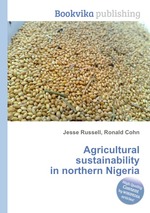Agricultural sustainability in northern Nigeria
Jesse Russell Ronald Cohn
бумажная книга
High Quality Content by WIKIPEDIA articles! Agricultural sustainability in northern Nigeria requires flexibility in both ecological management as well as economic activity. Rainfall occurs only seasonally – and there is a pronounced dry season – however, rainfall is often intensive when it does come, making it necessary for farmers to employ soil moisture conservation techniques. The main crops grown in the region are millet, sorghum, and cowpea, while groundnut and sesame are significant minor crops. Wild foods also serve as an important supplement to the diet, especially during times of food shortage. The bulk of crops are grown during the rainy season which begins in June or July, when temperatures are warmer. There has traditionally been a division between sedentary farmers made up of the Manga and Hausa people, and the nomadic pastoralists known as Fulani, however this has diminished in recent times. Historically, development plans for this region have focused on the use of imported technology and irrigation schemes, while neglecting traditional farming practices of the region. These traditional practices generally focus on the close integration between the raising of livestock and farming, and have been studied in detail in the Kano Close Settled Zone of Northern Nigeria.


